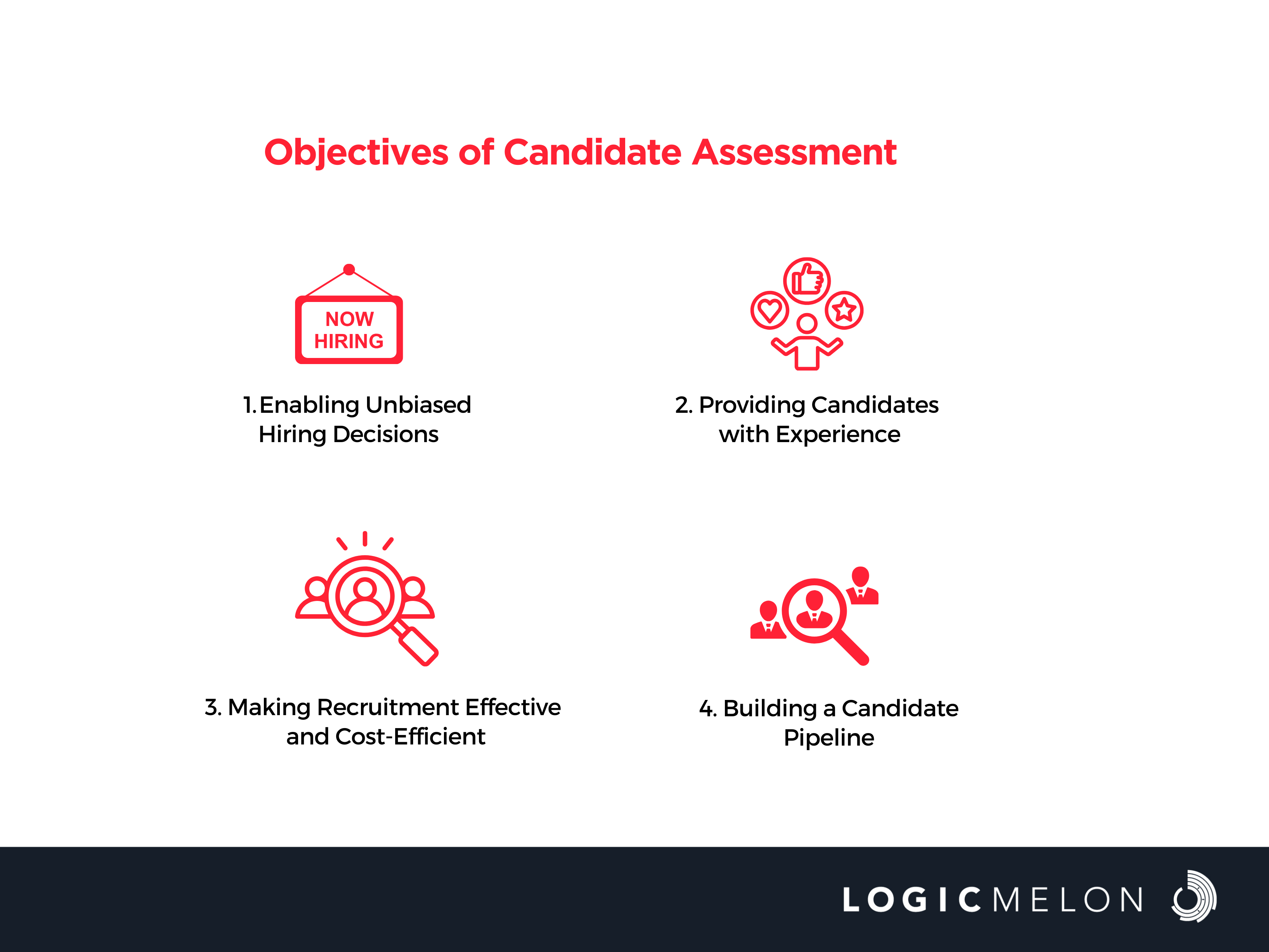10 Candidate Assessment Methods
Are you ready to dive into the fascinating world of candidate assessment? It’s not just about finding the right fit; it’s about uncovering hidden gems that will drive your organisation towards greater heights. So, let’s embark on this journey together, shall we?
Objectives of Candidate Assessment
Candidate assessment is the recruitment process’s secret sauce. It’s like tasting a spoonful of your grandma’s legendary stew to ensure it’s just right. In this case, the stew represents your potential employees, and you want to make sure they’re a perfect fit for your organisation’s recipe for success.

1. Enabling Unbiased Hiring Decisions
Imagine a recruitment process where biases are banished to the netherworld, and every candidate gets a fair shot. That’s precisely what candidate assessment aims to achieve. By relying on data and objective evaluation, it ensures a level playing field for all.
2. Providing Candidates with Experience
It’s not just about assessing candidates; it’s about giving them an experience they’ll remember. Think of it as a sneak peek into your organisation’s culture and values. Even if they don’t make the final cut, they’ll leave with valuable insights.
3. Making Recruitment Effective and Cost-Efficient
Effective recruitment isn’t just about finding the best talent; it’s also about doing it efficiently. Candidate assessment streamlines the process, ensuring you don’t waste precious time and resources on candidates who aren’t the right fit.
4. Building a Candidate Pipeline
You’re not just looking for one star; you’re nurturing a galaxy of potential talent. Candidate assessment helps you maintain a pipeline of candidates for future roles. It’s like having a collection of rare gems waiting to shine.
The Methods of Candidate Assessment
Now, let’s dive into the exciting methods and approaches to candidate assessment.
1. Skill Assessment:
Picture this as a talent show where candidates flaunt their skills. Skill assessment evaluates a candidate’s capabilities and compatibility with your organisation’s culture. It’s like finding that musician who perfectly complements your band.
2. Psychometric Testing:
Unlock the secrets of a candidate’s mind with psychometric tests. These tests delve into cognitive abilities, personality traits, and emotional intelligence. It’s like peering into a crystal ball to see how they’ll fit into your organisation’s puzzle.
3. Behavioural Interviews:
In this part of the recruitment waltz, we assess candidates by examining their past dance moves. Behavioural interviews focus on past behaviours to predict future performance. It’s like reading the choreography of their career.
4. Structured Interviews:
Imagine conducting interviews as meticulously as a symphony performance. Structured interviews follow a script and evaluation criteria to ensure consistency. It’s like composing a harmonious melody of questions.
5. Cultural Fit Assessment:
To build a symphony, every instrument must be in tune. Assess whether a candidate’s values and personality harmonise with your organisation’s culture. It’s like ensuring everyone in the orchestra plays the same tune.
Assessing cultural fit is an important aspect of the hiring process, whether or not your candidate has researched the company and understood the culture.
6. Reference Checks:
It’s time to call in the referees! Contact the candidates’ references to verify their qualifications and work history. It’s like cross-referencing the chapters of a book to ensure its authenticity.
7. Personality Assessments:
Ever wondered what makes a candidate tick? Personality assessments unveil a candidate’s personality traits and work style. It’s like creating a vivid portrait of who they are.
8. Emotional Intelligence Assessment:
For certain roles, emotional intelligence is a game-changer. This assessment evaluates a candidate’s ability to perceive, understand, and manage emotions. It’s like measuring their emotional IQ.
This assessment measures the individual’s emotional intelligence, which refers to their ability to recognise, understand, and manage emotions effectively.
9. Candidate Feedback:
Even if the stage isn’t set for a candidate, they deserve applause for their effort. Providing constructive feedback is a sign of professionalism and respect. It’s like offering a standing ovation even when the curtain falls.
Even if the candidates are not selected, they may refer others to the company or apply for future positions if they had a positive experience and received helpful feedback.
10. Rating:
Time to put on your judge’s hat and rate the candidates. Ratings help you decide which stars will take the spotlight. It’s like giving a scorecard to each candidate’s performance.
The purpose of a candidate rating depends on specific job roles and organisations, depending on the criteria set by them.
Frequently Asked Questions
1. What is a candidate assessment?
A candidate assessment is a process whereby the potential employer evaluates a candidate’s skills, experience, and qualifications. By using assessment tools to evaluate an employee’s skills and capabilities, an informed decision can be made on whether to hire them.
2. How are candidates typically assessed for cultural fit?
Cultural fit assessment tools often involve questions and scenarios that assess the candidate’s values, work style, and compatibility with the organisation’s culture. Some of the most common methods used by employers during the assessment of cultural fit are behavioural interviews, value-based questions, scenario-based questions, and reference checks.
3. How long does the assessment process typically take?
The duration of the assessment process varies depending on the organisation and role. While some assessments and video interviews can be completed in a matter of hours, others take several weeks. Employers often communicate the expected timeline during the recruitment process.
In the Spotlight: Candidate Assessment
In the grand performance of recruitment, candidate assessment plays a leading role. It’s the process that ensures your organisation welcomes not just employees but stars who will shine in their roles.
So, there you have it – a whirlwind tour of candidate assessment methods. Remember, the goal is not just to hire; it’s to create a symphony of talent that will propel your organisation towards greatness. Keep assessing, keep shining, and keep winning!
LogicMelon
Award-winning recruitment software that will find, attract, hire and analyse the way you want to work. At LogicMelon, we have experienced software recruitment marketing specialists to help you build effective recruitment solutions supported by the best customer service you’ll find anywhere!
Email: [email protected] or call LogicMelon (UK) +44 (0) 203 553 3667 (USA) +1 860 269 3089
Cognitive Ability Tests in Recruitment
Cognitive ability tests are used in the recruitment process to evaluate a candidate’s intellectual capabilities, problem-solving skills, and aptitude.
Benefits and Challenges of Outsourcing Recruitment
It is essential for organisations to carefully weigh the pros and cons and choose a outsourcing recruitment partner that aligns with specific needs and objectives.
The Psychology of Decision-making in Hiring
Hiring decisions are more than just the sum of a candidate’s qualifications and experience; they are influenced by decision-making.


